Vilsack: Only 1.8 Mil. of 4 Mil. Expiring CRP Acres Will Be Re-enrolled; Just 800,000 Acres in New Contracts
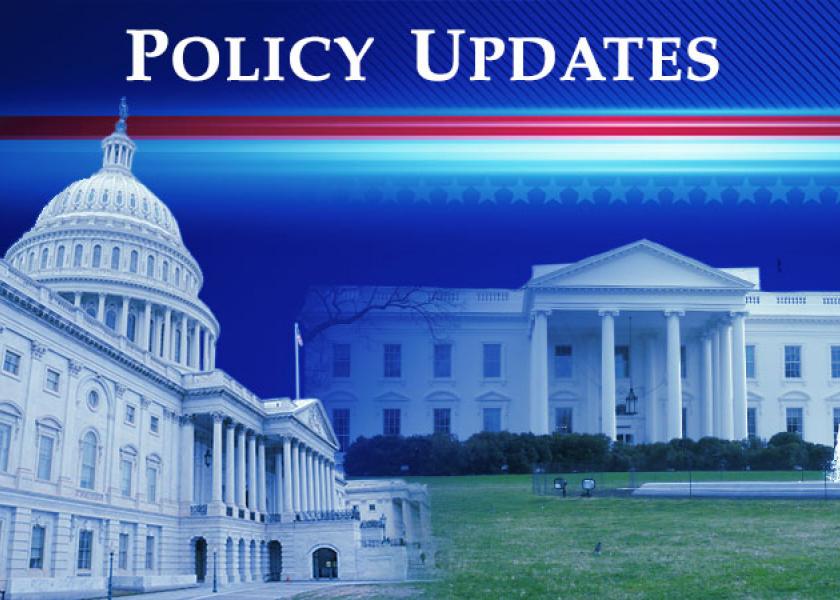
FOMC minutes | Big fertilizer, seed, labor woes in China | FJ surveys chemical retailers
|
In Today’s Digital Newspaper |
The EU announced a fresh sanctions package that proposed a ban on coal imports from Russia. The U.S. will unveil additional sanctions today. The U.S. has blocked Russia from using U.S. banks to make good on foreign debt payments, is planning a ban on all new investment in Russia and is expected to soon announce sanctions on its biggest banks. The Biden administration and the European Union are also considering sanctions on two daughters of Russian President Vladimir Putin. Meanwhile, Ukraine consolidated control over the north of the country following a Russian withdrawal and braced for a major new round of battles in the eastern Donbas region. And, China for the first time commented on reports of alleged war crimes in Ukraine.
Fed Vice Chair Lael Brainard pre-empted the FOMC minutes coming this afternoon by saying on Tuesday that a "rapid" reduction could happen as soon as May, calling the move "of paramount importance" to bring down inflationary forces, while the Fed is "prepared to take stronger action if indicators show such action is warranted." Treasury yields shot up on the news, climbing 14 basis points yesterday to settle at 2.55%. Things kept going overnight, with the yield breaching the 2.6% level after rising 10 bps to 2.65%.
Deutsche Bank became the first big bank to forecast a U.S. recession that begins in 2023. "We no longer see the Fed achieving a soft landing," wrote economists led by Matthew Luzzetti. "It is now clear that price stability... is likely to only be achieved through a restrictive monetary policy stance that meaningfully dents demand."
Treasury Secretary Janet Yellen is testifying on Russia today, in front of the House Financial Services Committee, where she will say that there will be “enormous economic repercussions for the world,” in food and energy security as well as debt sustainability.
Congestion at ports in China and elsewhere around the world is gridlocking about 10% of the global container-ship fleet, according to shipping line Ocean Network Express (ONE).
China’s strict Covid lockdowns are exacerbating serious shortages of fertilizer, labor and seeds, just as many of the country’s biggest agricultural provinces prepare for their crucial spring planting season, reports the Financial Times. Details in China section.
Are there enough chemicals and fertilizer to plant this year's U.S. crops? Farm Journal released a survey to help answer that question. Details and charts below.
USDA daily export sale: 132,000 metric tons of soybeans to China during the 2021-2022 marketing year.
USDA Secretary Tom Vilsack revealed some CRP data during remarks from Mexico. He said only 1.8 million of 4 million expiring CRP acres will be re-enrolled; just 800,000 acres in new contracts. Details in Policy section.
Top oil-industry leaders, including executives from Exxon, Chevron, Shell and BP, are set to face questions from lawmakers on why gasoline prices have hit near-record levels.
The Biden administration is looking to boost oil imports from Canada without resurrecting the Keystone XL pipeline. See details on how that can be accomplished.
Bird flu overcounting? APHIS suspended data on HPAI “a technical issue in data transfer caused an unexpected inflation of the counts on the HPAI Dashboard.”
U.S. pork producers to press lawmakers on public policies. Preparing for and preventing foreign animal diseases, addressing an agricultural labor shortage, and increasing pork exports are the top public policy issues pork producers will lobby their congressional lawmakers on over the next two days.
Student-loan pause: The Biden administration is planning to extend until the end of August a moratorium on federal student-loan payments. It will be the sixth such extension since the pandemic began. The delay comes less than a month before payments were scheduled to restart. With Nov. 8 midterm elections, odds are high the extension will again be lifted.
|
MARKET FOCUS |
Equities today: Global stocks markets were mixed to weaker overnight. The U.S. Dow opened around 280 points lower. Asian equites ended with losses in most markets. The Nikkei fell 437.68 points, 1.58%, at 27,350.30. Hong Kong’s Hang Seng fell 421.79 points, 1.87%, at 22,080.52 after being closed Tuesday for a holiday. Markets in mainland China closed nearly flat. European equities are also lower in early trading. The Stoxx 600 was off 1.6% and regional markets are seeing losses of 0.3% to 2.1%.
U.S. equities yesterday: The Dow closed down 280.70 points, 0.80%, at 34,641.18. The Nasdaq dropped 328.39 points, 2.26%, at 14,204.17. The S&P 500 lost 57.52 points, 1.26%, at 4,525.12.
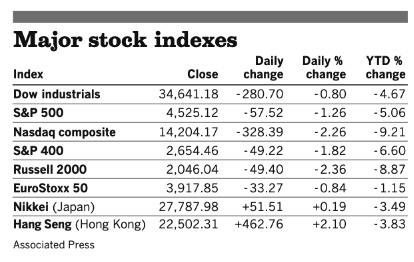
Agriculture markets yesterday:
- Corn: May corn futures rose 9 1/4 cents to $7.59 3/4, the contract’s highest settlement since $7.62 1/2 on March 11. December corn rose 7 1/2 cents to $7.06 1/2 and posted a contract high for the fourth consecutive session, touching $7.12 1/2.
- Soy complex: May soybeans rose 28 3/4 cents to $16.31, the highest closing price since March 30. May soymeal rose $10.80 to $465.90 per ton and May soyoil rose 7 points to 72.41 cents per pound.
- Wheat: May SRW wheat rose 35 cents to $10.45 1/4, the contract’s highest closing price since $10.57 on March 28. May HRW wheat rose 45 cents to $10.82 3/4. May spring wheat rose 26 3/4 cents to $11.11 3/4, the highest settlement since March 8.
- Cotton: May cotton fell 41 points to 137.53 cents per pound. December futures climbed 106 points to 114.82 cents.
- Cattle: June live cattle futures sank $1.60 to $133.325, the lowest closing price since $132.95 on March 11. May feeder futures fell $3.475 to $159.00, the contract’s lowest close in 10 months.
- Hogs: June lean hogs fell $1.80 to $114.35, the contract’s lowest close since $112.80 on March 9. April hogs fell $1.775 to $97.675.
Ag markets today: Grain and soy markets faced price pressure overnight. As of 7:30 a.m. ET, corn was trading 3 to 6 cents lower near its session low. Soybeans were 1 to 4 cents lower, winter wheat was mostly 9 to 13 cents lower and spring wheat was 8 to 12 cents lower. Front-month U.S. crude oil futures were near unchanged after earlier pushing above $103 and the U.S. dollar index was near unchanged.
Technical viewpoints from Jim Wyckoff: “Fed governor Lael Brainard on Tuesday said the Russia/Ukraine war has further stoked inflation and that inflation must be tamped down aggressively. She also suggested the Fed will begin selling off its big balance sheet of bonds (quantitative tightening). U.S. Treasury yields spiked up on her remarks. Traders are hoping to get better clarity of the Fed’s interest rate and balance sheet intentions by scrutinizing this afternoon’s minutes from the last FOMC meeting three weeks ago.”
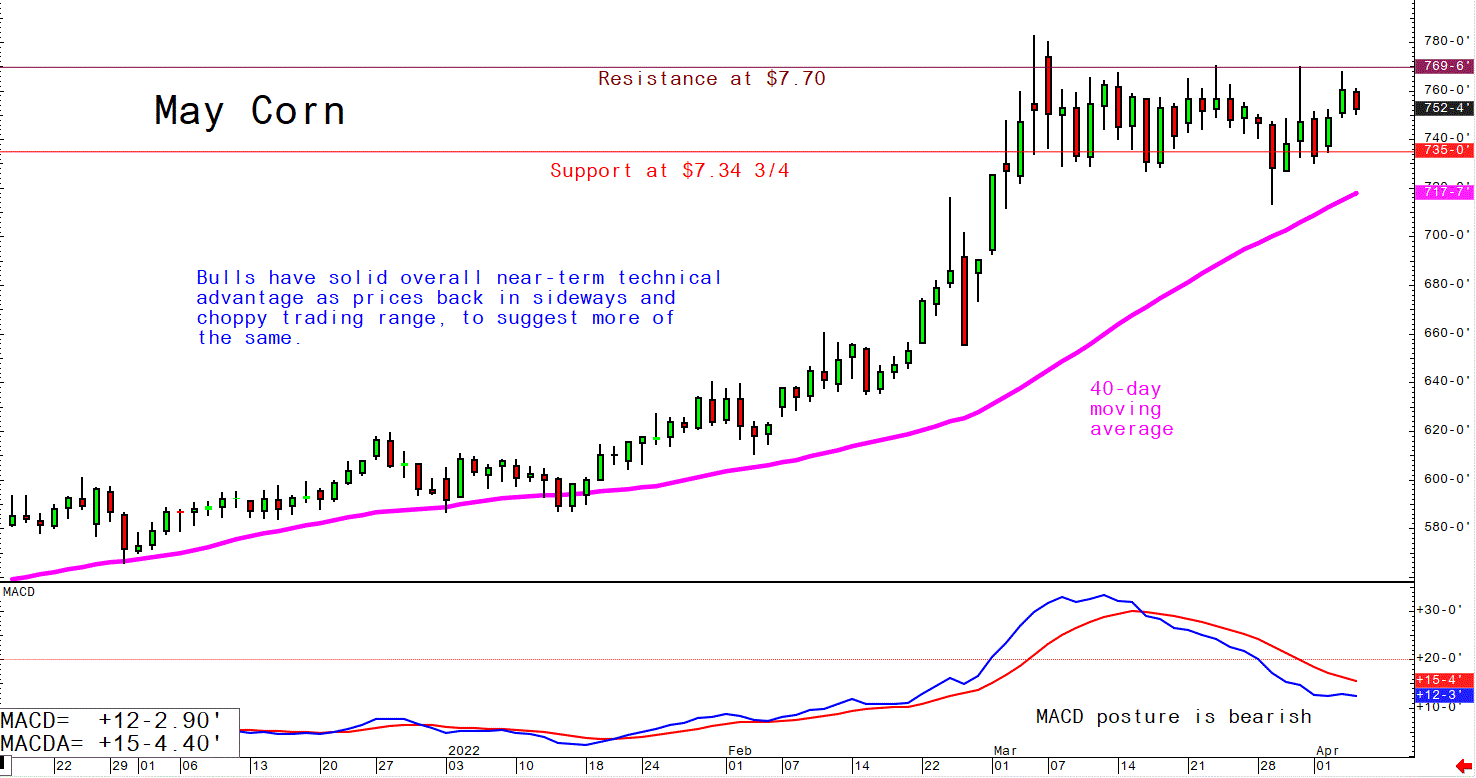
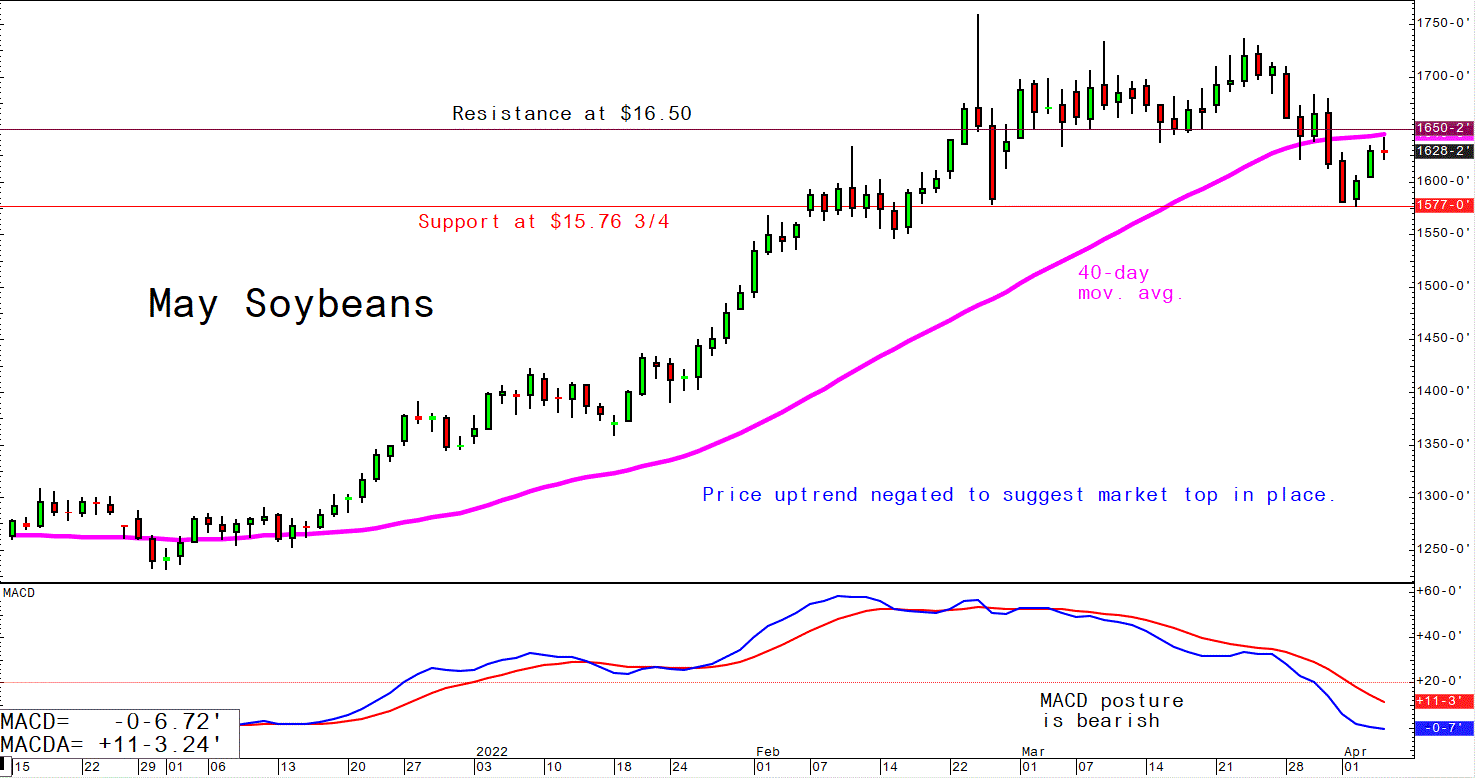
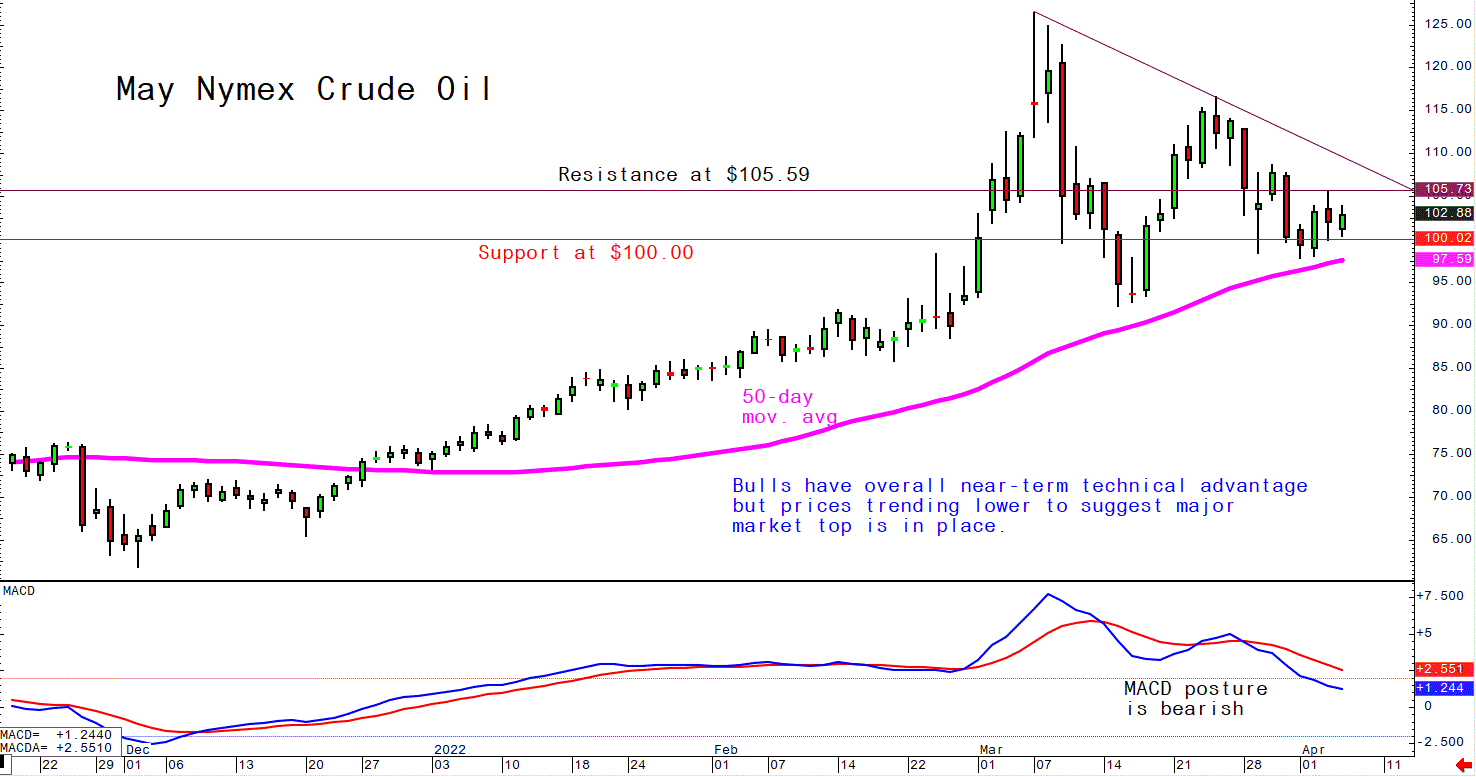
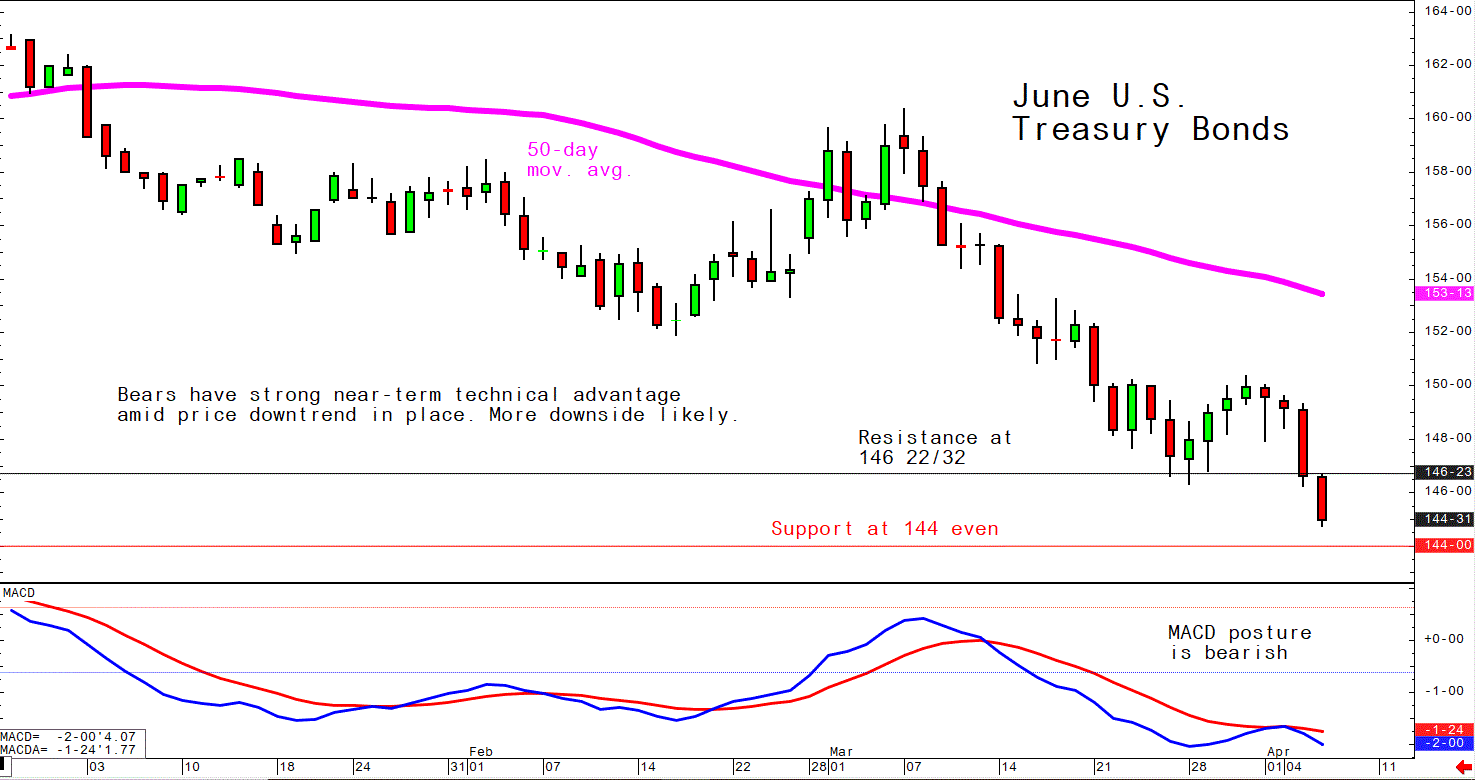
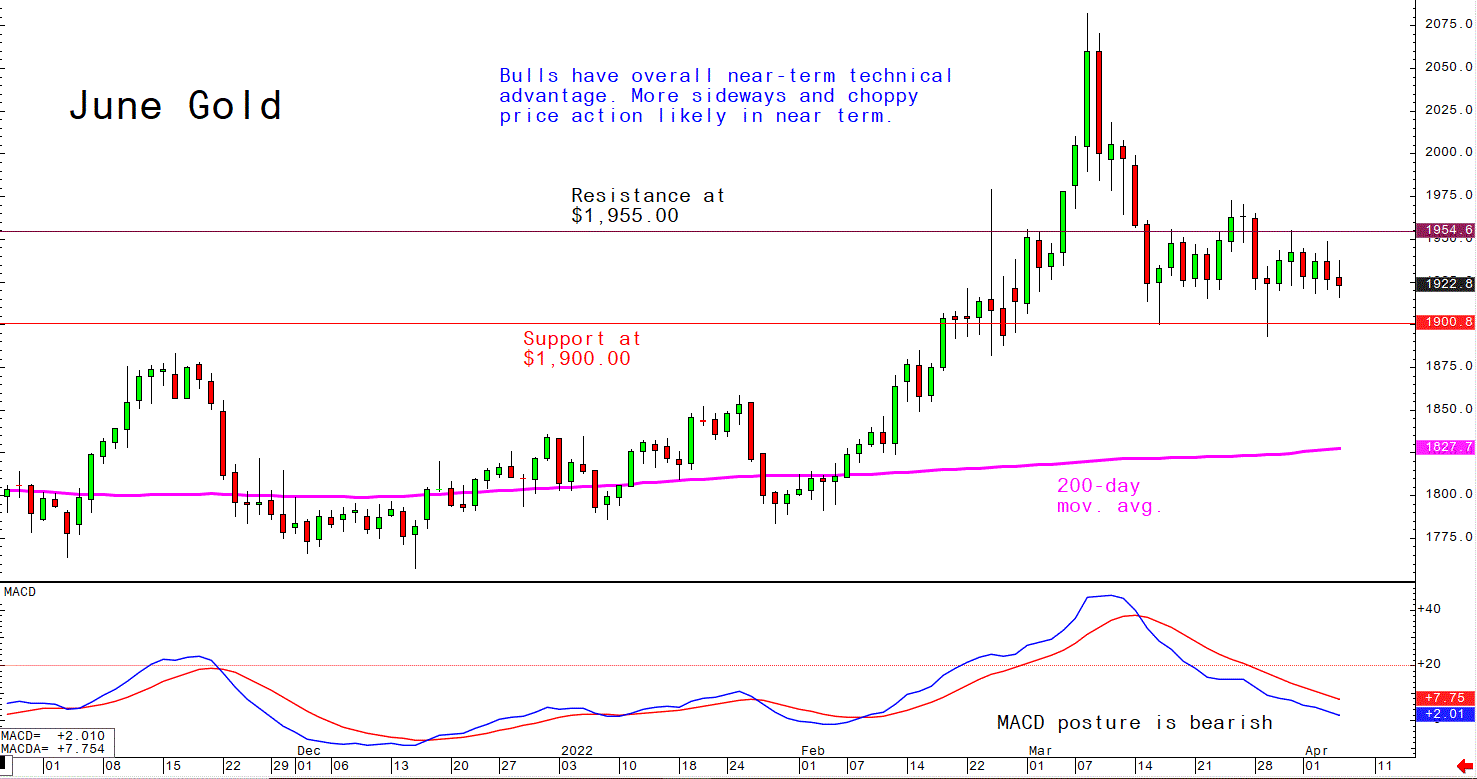
On tap today:
• Philadelphia Fed President Patrick Harker speaks on the economic outlook at 9:30 a.m. ET.
• Chief oil executives from ExxonMobil, Chevron and other oil-industry leaders appear before the House Energy and Commerce Committee to face questions on why gasoline prices have hit near-record levels. (10:30 a.m. ET)
• Federal Reserve releases minutes from its March 15-16 meeting at 2 p.m. ET.
• EPA Administrator Michael Regan is set to testify before the Senate Environment and Public Works Committee on the EPA’s fiscal 2023 budget request.
FOMC minutes released this afternoon are expected to shed light how quickly the central bank plans to raise rates and reduce its bond holdings. On Tuesday, Federal Reserve Governor Lael Brainard, who is awaiting confirmation as vice chair, said that the Fed “will continue tightening monetary policy methodically through a series of interest rate increases and by starting to reduce the balance sheet at a rapid pace as soon as our May meeting.” She said that “given the recovery has been stronger and faster,” the balance sheet will shrink much more quickly this time than when the Fed attempted quantitative tightening in 2017 and 2018. There will be “significantly larger caps and a much shorter period to phase in the maximum caps,” she said, adding “it is of paramount importance to get inflation down.” Money-market traders bet on the sharpest Fed tightening in almost three decades, with pricing suggesting 250 basis points of hikes in 2022.
Bottom line: As the Wall Street Journal notes, Brainard’s remarks “were notable not only because she is one of Fed Chairman Jerome Powell’s top lieutenants in shaping the central bank’s monetary-policy agenda but also because she had been one of the most vocal advocates last year warning against prematurely pulling back its stimulus.” Meanwhile, Agustín Carstens, the former head of Mexico’s central bank and the general manager for the Bank for International Settlements, said the world may be on the cusp of a new inflation era that will require interest rates, adjusted for inflation, to be brought above the so-called neutral level.
Hard or soft landing for the Federal Reserve? More economists, academics and investors are forecasting a hard landing for the U.S. economy.
- Deutsche Bank economists said they “anticipate that a more aggressive tightening of monetary policy will push the economy into a recession.” The possible timing: negative quarters for growth in 4Q 2023 and 1Q 2024.
- Harvard's Alex Domash and (former Treasury Secretary) Lawrence Summers in a new research paper find “a very low likelihood that the Federal Reserve can reduce inflation without causing a significant slowdown in economic activity.”
- In a Boston Consulting Group survey conducted March 18–22 and released Tuesday, 65% of investors expected a recession in 2022 or 2023.
- But San Francisco Fed President Mary Daly said she doesn’t expect a recession due to central-bank efforts to bring down inflation. “I’m fairly optimistic about the U.S. economy,” Daly said Tuesday.
30-year fix above 5%. The average rate on the 30-year fixed mortgage just crossed 5%, marking the first time it has passed the threshold since 2011 (save two days in 2018). It wasn't that long ago that consumers could have refinanced their mortgages below 3%, but the majority of those applications have since dried up. Homebuyers are also facing a pricey housing market, with a report from CoreLogic showing prices in February were up 20% from a year ago, marking the 12th consecutive month of annual increases.
U.S. agricultural exports, imports fell in February. U.S. agricultural exports totaled $15.61 billion in February, down $264 million from January, but still $1.75 billion above February 2021 shipments, according to USDA data collected from the Census Bureau.
Agricultural imports declined to $14.4 billion, down $1.30 billion from January, but they were up $2.53 billion from February 2021. This resulted in a trade surplus of $1.22 billion for the month, up from just $179 million in January. That puts cumulative U.S. agricultural exports at $84.1 billion so far in fiscal year (FY) 2022 with imports at $74.96 billion for a surplus of $91.41 billion. At this point in FY 2021, exports totaled $76.95 billion against imports of $62.29 billion for a surplus of $14.66 billion.
With USDA forecasting exports to be $183.5 billion in FY 2022 and imports at $172.5 billion, both records, U.S. agricultural exports would need to be $14.2 billion for the next five months and imports at $13.93 billion to meet those forecasts. Exports were below that needed pace over the June-September 2021 period while imports were above that level over March-September 2021. The March-June period tends to see some of the highest import values each FY even though the January mark of $15.7 billion was a new record. U.S. agricultural exports tend to be strongest in the opening months of each FY with the $18.48 billion notched in November 2021 a new record for monthly shipments. Given the outlook, the monthly trade gap will be relatively narrow for the remainder of FY 2022 and monthly deficits could be seen — U.S. agricultural imports outpaced exports in June-September 2021 for a cumulative deficit of $6.95 billion over that period.
Canada ran another large trade surplus in February, as the nation benefits from surging prices for oil. The country shipped C$2.7 billion ($2.2 billion) more abroad than it bought from other countries during the month, with exports rising 2.8%, Statistics Canada reported on Tuesday. The surplus narrowed from C$3.1 billion in January, as imports increased by more than exports.
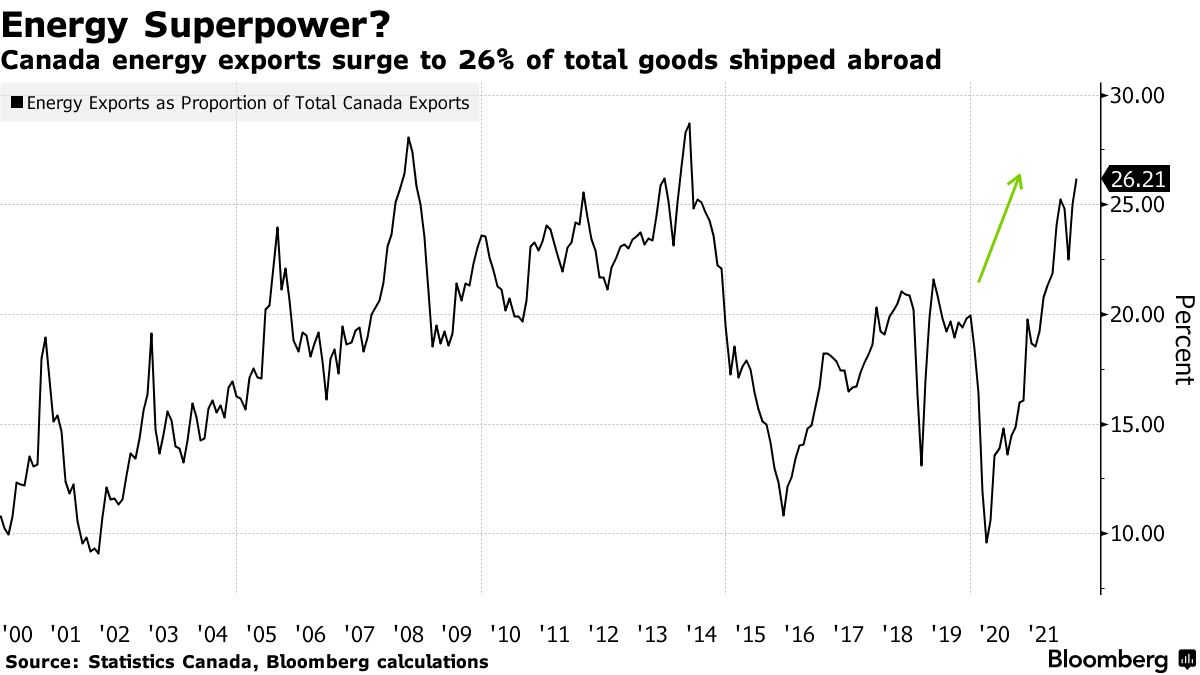
Eurozone PPI increases. Eurozone reported its producer price index (PPI) for February up 31.4%, year-on-year. Traders expected a 31.5% increase. In January, the producer price index had an annual 30.6% increase. Excluding food and energy, the PPI was up “only” 12.2% from last February. Energy costs surged 87.2% followed by intermediate goods (20.8%), durable consumer goods (7.2%), non-durable consumer goods (6.8%) and capital goods (5.9%). On a monthly basis, producer prices rose 1.1%, after a 5.1% jump in January.
Market perspectives:
• Outside markets: The U.S. dollar index is weaker ahead of U.S. market action with several currencies stronger against the greenback. The yield on the 10-year U.S. Treasury note was firmer, trading around 2.62%, with a firmer tone in global government bond yields. Gold and silver futures are under pressure, with gold under $1,925 per troy ounce and silver under $24.26 per troy ounce.
• Risk on or risk off?
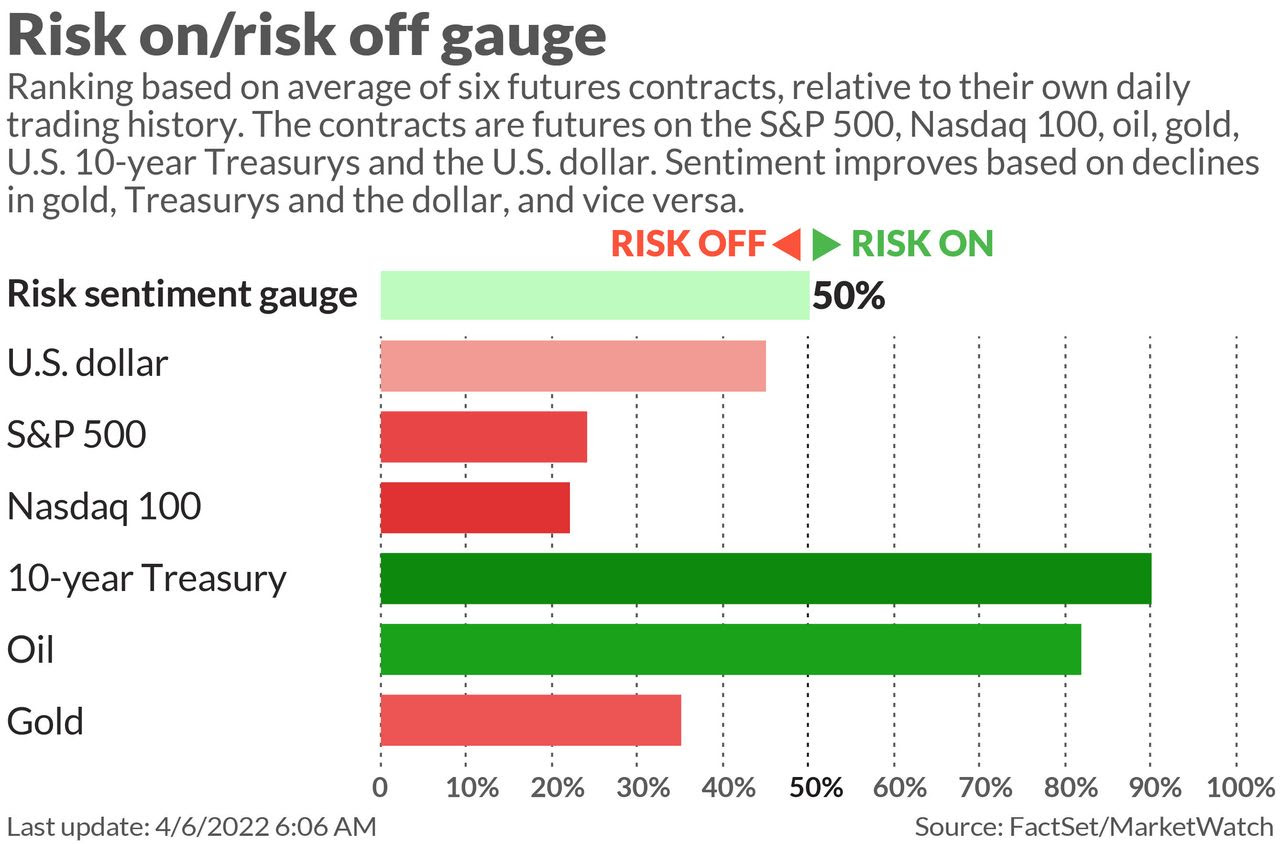
• Crude oil futures are higher ahead of U.S. gov’t inventory data due later this morning. US crude is trading around $102.80 per barrel and Brent around $107.40 per barrel.
• U.S. wants more oil from Canada but not a new pipeline to bring it. Biden administration officials are seeking ways to boost oil imports from Canada, people familiar with the situation told the Wall Street Journal, but with one big caveat: they don’t want to resurrect the Keystone XL pipeline that President Biden effectively killed on his first day in office. The people said deliberations are in early stages and that no clear-cut solutions have emerged. Canada could export some more oil via rail, according to analysts and others familiar with the situation, and it could also pump more oil by increasing pressure on existing lines or by installing larger pipelines along permitted routes. Longer term, Canadian officials and oil-industry analysts say expanding the existing Keystone pipeline network would offer a bigger, more efficient solution. The XL expansion was to carry 830,000 barrels a day of Canadian crude from Alberta to Nebraska, where the pipeline would meet up with the existing Keystone pipeline, and then on to refineries on the U.S. Gulf Coast.
• Kazakhstan restricts wheat, flour exports. Kazakhstan will limit wheat exports to 1 MMT and wheat flour exports to 300,000 MT until June 15. The limits would take effect within two weeks, according to Agriculture Minister Yerbol Karashukeyev. Exporters will also be required to sell 100,000 MT of wheat and 30,000 MT of flour on the domestic market "at a low price." The country usually exports about 500,000 MT of wheat and 100,000-120,000 MT of flour per month at this time of year.
• Sunflower group expects more U.S. acres. National Sunflower Association expects U.S. farmers to plant 20% more sunflower acres this year. Last week, USDA estimated sunflower acreage would be up 10% in 2022. The group is fielding calls from first-time sunflower farmers asking for information about planting the crop. The cash market price for new-crop sunflowers is now almost $34 per 100 pounds, surpassing the prior all-time high of $30.50 in 2008. Old crop prices are also nearing the record reached in 2011.
• EU grain exports could expand by 30% in the marketing year that opens on July 1 with a "very good" harvest expected for grains and oilseeds, cushioning "the impact on world markets of the expected lack of grain exports from Ukraine."
• Are there enough chemicals and fertilizer to plant this year's U.S. crops? Farm Journal released a survey to help answer that question (link for details). Results:
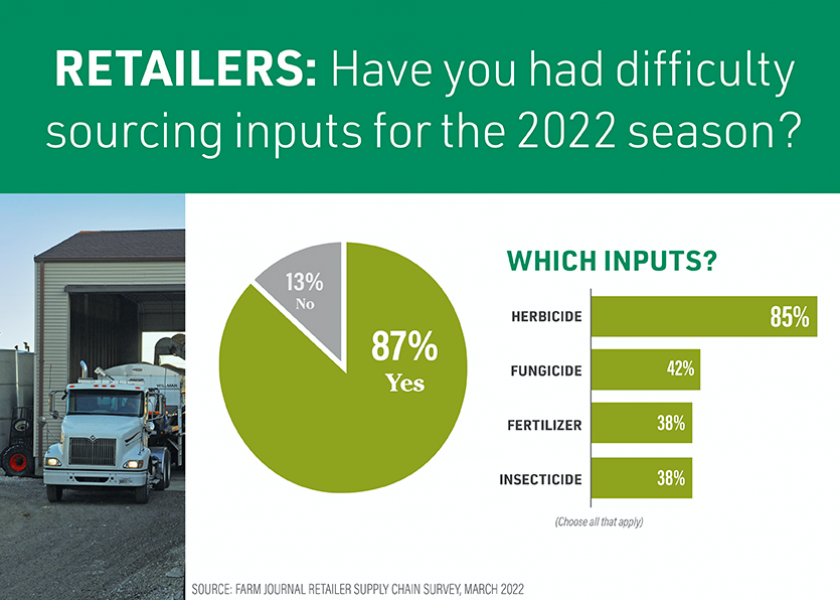
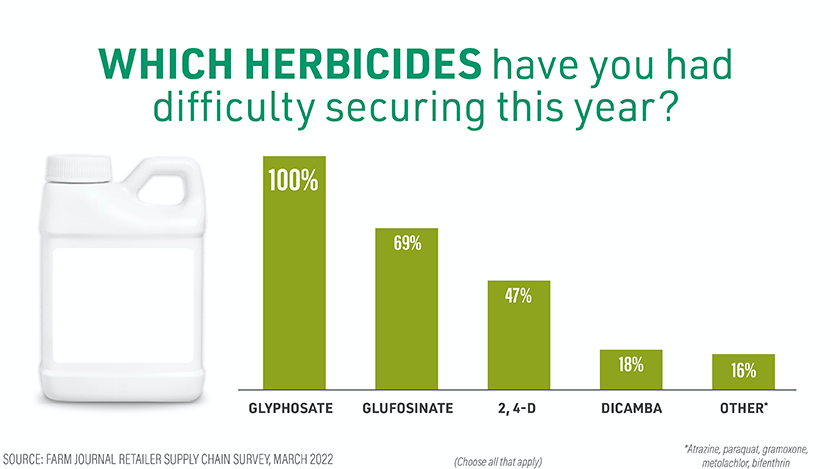
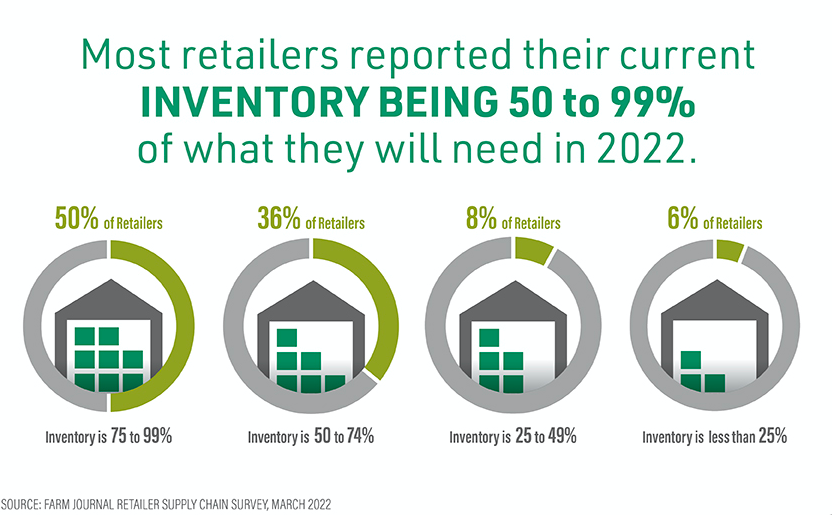
• NWS weather: An expansive low-pressure system will deliver persistent wet snow over the upper Midwest, strong to severe thunderstorms across the Southeast, and areas of heavy rain along the East Coast... ...Widespread strong/high winds continue from the Rockies to much of the Plains with elevated to extreme fire risk over the central to southern High Plains... ...Heat is expected to challenge high temperature records over California.
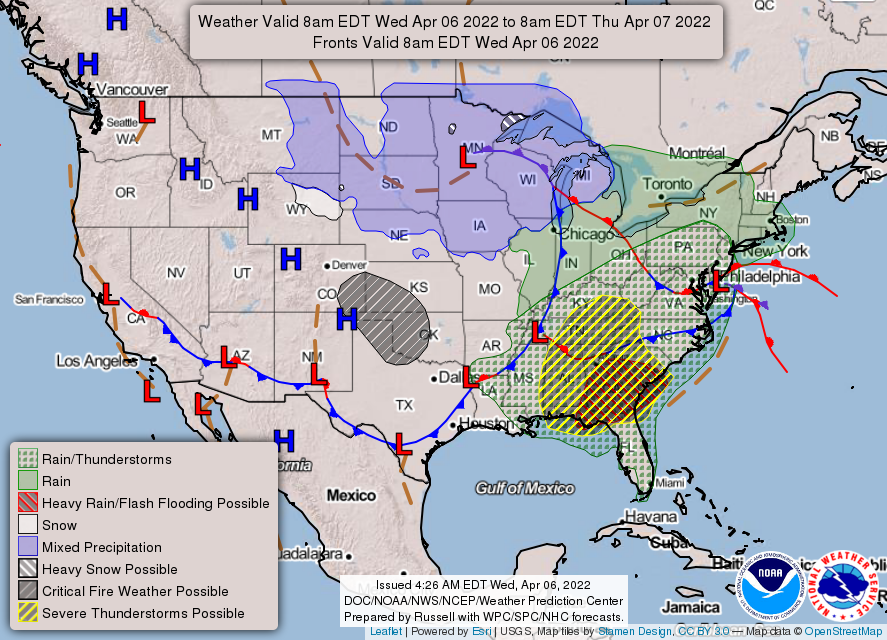
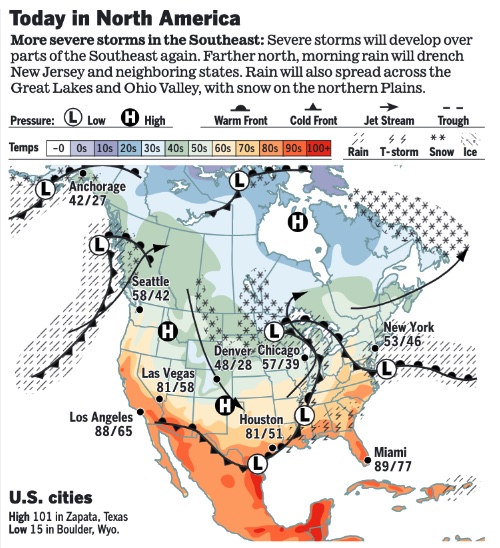
Items in Pro Farmer's First Thing Today include:
• Grain, soy markets decline overnight
• Russia to limit fertilizer exports until spring
• Ample rain fuels Australian wheat optimism
• Kazakhstan restricts wheat, flour exports
• Tunisia hikes local wheat prices
• Wholesale beef trade strengthens
• Cash hog fundamentals weaken
|
RUSSIA/UKRAINE |
— Summary: Fighting and Russia airstrikes continue in the besieged eastern city of Mariupol, where aid agencies say the humanitarian crisis is worsening, with most of the 160,000 remaining residents lacking access to electricity or food, the U.K. Minister of Defense warned. Meanwhile, the U.S., EU and G7 are coordinating on a fresh round of sanctions on Russia, including a U.S. ban on investment in the country and an EU ban on coal imports. Announcements are expected today.
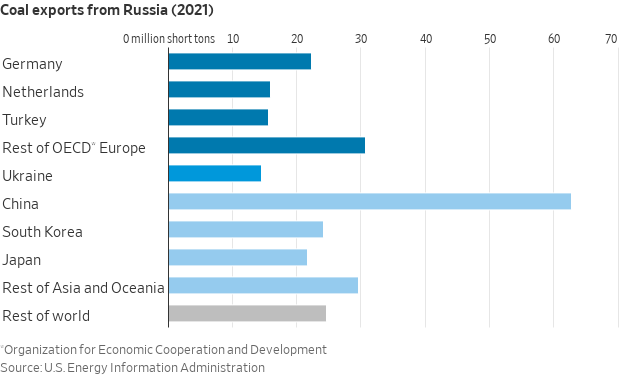
- Russia's invasion of Ukraine: "We are witness to the greatest threat to the peace and security of Europe and perhaps the world in my 42 years of service in uniform," America's top military officer, Joint Chiefs Chairman Army Gen. Mark Milley, said during a hearing on the Pentagon's $773 billion budget request on Capitol Hill. "The Russian invasion of Ukraine is threatening to undermine the global peace and stability that my parents — and generations of Americans — fought so hard to defend… With the invasion of Ukraine, Putin has created a dangerous, historical turning point and has invaded a free and democratic nation and its people without provocation," Milley said. "Shoulder-to-shoulder with our allies, we have bolstered NATO's Eastern Flank and imposed wide-ranging costs on Russia, demonstrating our willingness to defend the international, rules-based order." Milley's advice: "The United States needs to pursue a clear-eyed strategy of maintaining the peace through unambiguous capability of strength relative to [China] and Russia," which Milley said the White House's budget request addresses. "This requires we simultaneously maintain readiness and modernize for the future. If we do not, then we are risking the security of future generations."
- Biden administration today will announce new U.S. sanctions that would ban all new investment in Russia. The measures will also sanction Russian state-owned enterprises and financial bodies, as well as Russian government officials and their family members. Meanwhile, the U.S. said it will provide an additional $100 million in military assistance to Ukraine. It will go towards strengthening Ukraine’s anti-armor systems. America has pledged $1.7 billion worth of military hardware since the war began.
- EU set to add high-profile Russian executives to sanctions list. The European Union today will discuss adding Herman Gref, the head of Russia’s Sberbank, and aluminium oligarch Oleg Deripaska to its sanctions list as it seeks to tighten the screw on Russian businesses following the invasion of Ukraine, the Financial Times reports (link). Meanwhile, EU Council President Charles Michel said measures to restrict Russian oil and gas will have to be discussed "sooner or later.’’
- U.S. Secretary of State Antony Blinken said that the reports from Bucha were “more than credible” and placed the blame further up Russia’s chain of command, calling the events “not the random act of a rogue unit” but “a deliberate campaign to kill, to torture, to rape, to commit atrocities.”
- India will continue buying cheap Russian oil in the nation’s interest, Finance Minister Nirmala Sitharaman said. “We have started buying, we have received quite a number of barrels — I would think three-four days supply and this will continue,” Sitharaman said at a CNBC-TV18 event on Friday. “India’s overall interest is what is kept in mind.” The country has contracted Russian crude oil for deliveries over the next three to four months, Oil Minister Hardeep Singh Puri said last week. Russia is offering more oil to India at a discount of as much as $35 a barrel on prices before the war.
- Treasury Secretary Janet Yellen is testifying on Russia today, in front of the House Financial Services Committee, where she will say that there will be “enormous economic repercussions for the world,” in food and energy security as well as debt sustainability.
— Market impacts:
- Commodities volatility is here to stay: Cargill’s Broussard. Wild swings in commodities from wheat to crude oil are here to stay with global supply chains getting reassessed in the wake of Russia’s invasion of Ukraine, according to Gregory Broussard, global head of financial trading for Cargill Inc.’s risk management unit. An economic ostracization of Russia is likely to persist even if the war ends, prompting reconsideration of how critical supplies like grain, fertilizer and fuel are sourced and produced, Broussard told Bloomberg. Countries will likely start hoarding commodities as a caution. “We will exit this war from the supply side tighter than we entered it,” he said. “When people start throwing sanctions around, they don’t just dissipate overnight. It has implications for routing of raw materials.” Bottom line, according to Broussard: “Everyone is going to look at how they source raw materials, if they can in fact produce those raw materials themselves such as not to have to deal with a player like Russia.”
- Africa faces food-security crisis. A quarter of Africa’s population is facing a food-security crisis driven by severe drought, raging wars and a rise in world food prices caused by Russia’s invasion of Ukraine, the International Committee of the Red Cross warned Tuesday. Some 346 million people, from Mauritania in the west to the Horn of Africa in the east, are affected by food insecurity, Dominik Stillhart, the agency’s global operations director, told reporters in Nairobi. Russia and Ukraine were major grain suppliers before the war, and the conflict is causing pain across the developing world, spurring price shocks, constraining imports of basic commodities and causing food shortages, with poorer nations in Africa especially affected.
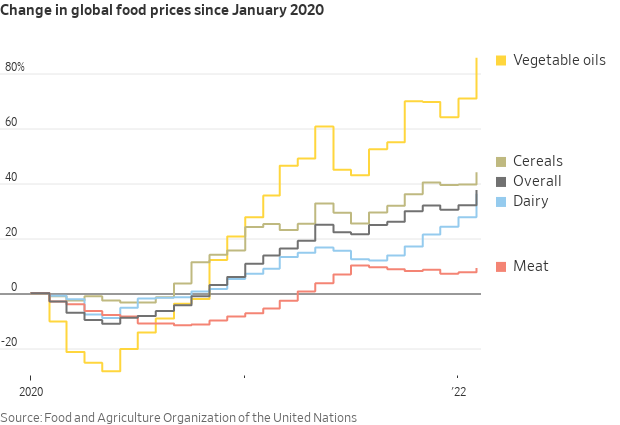
- Russian car sales plunged as sanctions aimed at the nation’s economy battered the ruble and many global auto companies joined a boycott of the country, leaving buyers confronting sparse showrooms.
- A shortage of shipping pallets may be one reason why the Kremlin’s forces are struggling to gain ground, says a guest on Bloomberg’s Odd Lots podcast.
- Russia said that foreign banks refused to process a $649 million bond payment, so it sent rubles via local banks instead. New restrictions on the Russian government’s access to dollars for bond payments are pushing it closer to default. Link for details.
|
POLICY UPDATE |
— Vilsack: only 1.8 million of 4 million expiring CRP acres will be re-enrolled; just 800,000 acres in new contracts. During a call with reporters from Mexico on Tuesday, USDA Secretary Tom Vilsack provided more details regarding the general Conservation Reserve Program (CRP) signup that ended March 11. He said only 1.8 million of the 4 million acres in expiring contracts will be re-enrolled in the program as 52% to 56% of the maturing acres were not offered in the general signup. He also said that new contracts on around 800,000 acres would be offered. That would be a net loss of about 1.4 million total CRP acres, which would mesh with Vilsack stating that there would be a net reduction in CRP of around 1.5 million acres. “We got a few new contracts but nowhere near the number of contracts that did not re-up,” Vilsack said, adding the data prove there was no reason for him to open CRP to emergency cropping. “The market basically responds to signals and farmers make the decision,” he said.
— A $10 billion bipartisan plan to provide more Covid preparedness funds is delayed on the eve of a two-week congressional recess, as Democrats and Republicans are at odds over whether they will use the measure to debate President Joe Biden’s border and immigration policies. After failing Tuesday to get enough votes to cut off debate on the Covid package he negotiated with Republicans, Senate Majority Leader Chuck Schumer (D-N.Y.) is evaluating how he can still advance the measure before lawmakers start a spring break without having to give in to GOP demands to vote on an amendment to maintain Title 42 restrictions that have been used to deny asylum claims at the U.S./Mexico border.
The Title 42 policy is also the subject of a hearing today by the House Homeland Security Subcommittee on Border Security, Facilitation, and Operations. The Biden administration announced Friday it plans to end the public-health authority on May 23, giving officials some time to prepare for an expected influx of migrants at the U.S./Mexico border that poses significant political and humanitarian challenges for the White House ahead of the midterm elections. The Centers for Disease Control and Prevention announced Friday that the transition period would enable the Department of Homeland Security to implement “appropriate Covid-19 mitigation protocols, such as scaling up a program to provide Covid-19 vaccinations to migrants and prepare for resumption of regular migration.”
— Tenfold increase proposed for rural energy program. Congress should guarantee at least $500 million a year for USDA grants and loan guarantees to install renewable energy systems or improve energy efficiency on farms and small businesses in rural areas —10 times the current funding level, the Environmental Law and Policy Center (ELPC), based in Chicago, said on Tuesday. House Agriculture chairman David Scott (D-Ga.) said mandatory funding levels for USDA energy programs would be considered as part of writing the next farm bill. Scott pointed to “a troubling trend” in the 2008, 2014 and 2018 farm bills of providing less mandatory funding for USDA energy programs than in the 2002 Farm Bill. Link to written testimony for the hearing.
|
CHINA UPDATE |
— Congestion at ports in China and elsewhere around the world is gridlocking about 10% of the global container-ship fleet, according to shipping line Ocean Network Express (ONE). Ships are “locked up waiting in congested areas” and are burning lots of fuel, Jeremy Nixon, the chief executive officer of ONE, said at the Marine Money conference in Singapore on Tuesday. “If we can release that bottleneck, we can get services back on schedule again.”
— China gives first public response to reports of alleged war crimes in Ukraine. China has given its first public response to the reports and images of civilian deaths in the Ukrainian city of Bucha, with its U.N. envoy describing them as “very disturbing.” Addressing a Security Council meeting on Tuesday, Zhang Jun said civilians should not be targeted in armed conflicts, while stressing that accusations should be based on facts. “Reports and images of civilian deaths in Bucha are very disturbing, and the circumstances and specific causes of the incident must be ascertained,” he said. “Any allegations should be based on facts, and all parties should exercise restraint and avoid groundless accusations until conclusions are drawn.” An editorial in Global Times, the nationalist tabloid affiliated with party mouthpiece People’s Daily, said the incident should not be used as a pretext for inflaming the situation.
— China’s zero-Covid policy risks causing agricultural crisis and food shortages: FT. China’s strict Covid lockdowns are exacerbating serious shortages of fertilizer, labor and seeds, just as many of the country’s biggest agricultural provinces prepare for their crucial spring planting season, reports the Financial Times (link/paywall). According to official data, as many as a third of farmers in northeastern Jilin, Liaoning and Heilongjiang provinces have insufficient agricultural inputs after authorities sealed off villages to fight the pandemic. The three provinces account for more than 20% of China’s grain production. According to the Jilin provincial government, about one-third of farmers did not have enough fertilizer at the end of March — only about three weeks before they were supposed to begin planting. Farmers and factory managers have blamed the disruption on China’s uncompromising zero-Covid policy, under which authorities have adopted tough controls ranging from traffic bans to local business shutdowns. An executive at Genliduo, a leading fertilizer producer in Hebei province, said his firm was having “lots of difficulty” shipping to customers and securing raw materials. The executive added that the problem was industry-wide and many smaller producers had suspended operations.
— Several Chinese companies are tapping U.S.-based accounting firms as their principal auditors as they try to avoid being booted off American stock exchanges.
— China's Big Oil to pour cash into boosting domestic output. Capital spending to rise to highest level in 8 years amid energy security drive. Link for details.
— Argentina wants China to fully fund $8.3 billion nuclear plant amid cash shortfall. Argentina is pushing China to fully finance a new $8.3 billion nuclear power plant in the country, as the government grapples with high debt levels and looks to bring down its fiscal deficit as part of a recent deal with the International Monetary Fund.
|
ENERGY & CLIMATE CHANGE |
— Chief executives of the top oil companies are set to testify today on high oil and gas prices before a House Energy and Commerce subcommittee. The committee has already posted the witnesses written testimony (link), but Sen. Joe Manchin (D-W.Va.), chairman of the Senate Energy and Natural Resources Committee, gave the oil executives some pointers. “You better know what the hell you’re doing when you walk in there,” Manchin said. “You better have your game on. You better be ready.”
Meanwhile, Democratic Senators Maria Cantwell (Wash.), Dianne Feinstein (Calif.) and Ron Wyden (Ore.) asked for an investigation into trading practices that may have played a role in artificially elevating wholesale petroleum prices in California, Oregon and Washington, in a letter to Lina Khan, chair of the Federal Trade Commission.
— Alternative jet fuel incentive sought. United Airlines CEO Scott Kirby urged congressional leaders to establish a new tax credit for blenders of low-carbon sustainable aviation fuel, touting it as an important tool to combat climate change and a way to insulate airlines from volatility in oil markets. Kirby, in a Tuesday letter (link), said high costs compared to conventional fossil fuels are a major barrier for production and use of low-carbon fuel by the airlines. “Neither United nor the broader industry can do this on its own,” Kirby said. “Successful development of decarbonization technologies — such as sustainable aviation fuel (SAF) and carbon removal — urgently requires support from policymakers.” Kirby pointed to the Sustainable Skies Act — introduced in the House (HR 3440) by Rep. Brad Schneider (D-Ill.) and the Senate version (S 2263) from Sen. Sherrod Brown (D-Ohio) — as a model for what the company wants.
— NHTSA probe into EV batteries. The National Highway Traffic Safety Administration (NHTSA) has launched a probe covering an estimated 138,324 electric and hybrid vehicles at risk of catching fire when parked or in use, citing documents posted Tuesday on the agency’s website. South Korea-based LG Energy Solution said it is cooperating with the inquiry, which may include cars made by Stellantis, Volkswagen, General Motors, Hyundai and Mercedes-Benz. “We understand NHTSA’s latest request is a follow-up procedure to determine if the same or similar batteries involved in the recalls were supplied” to other carmakers, the company said in a statement.
— Battery investment update. We are going to need a lot of batteries,” Elon Musk said last year at a Tesla event. Wood Mackenzie estimates that 18% of new cars sold will be electric by 2030, far outstripping current battery output. Battery manufacturing is dominated by companies like Tesla, Panasonic and LG Chem, but new players are emerging. Venture investors in the U.S. put $1.8 billion into the industry in 2021, far above any previous year, according to PitchBook.
Over the past few years, Koch Industries has also been a big investor in batteries. Koch Strategic Platforms is investing $30 million in Blue Current, which it will use to build a pilot and take it to production, the New York Times DealBook is first to report. Its list of investments includes Aspen Aerogels, Eos Energy Enterprises, Standard Lithium and, now, Blue Current.
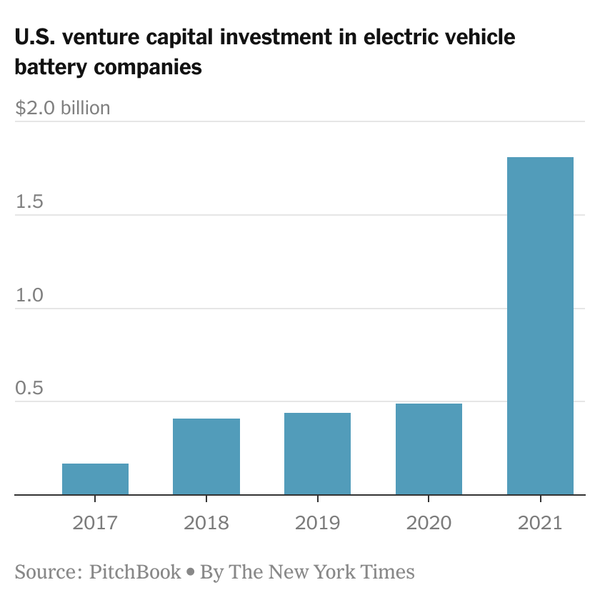
— General Motors Co. and Honda Motor Co. announced an electric vehicle collaboration to split development costs and reduce the price of batteries to create a line of more affordable EVs, including compact sport-utility vehicles. The companies said the first of the vehicles developed under the partnership will likely cost less than $30,000 in the United States and will be available by 2027.
|
LIVESTOCK, FOOD & BEVERAGE INDUSTRY |
— Vilsack: Bird flu impact on U.S. poultry exports is muted. USDA Secretary Tom Vilsack said he doesn’t expect major export losses for U.S. poultry producers from a bird flu outbreak that has spread to 24 states. While the outbreak has prompted more than 80 countries to curb imported U.S. products, Vilsack said the restrictions have been limited to poultry raised in affected counties or states. “There has not been an effort to do a nationwide restriction,” he said in a conference call with reporters. “We haven’t seen that, which is a positive indication.”
Improvements in biosecurity since a major outbreak in 2014 and 2015 have helped limit the spread, according to Vilsack. Also, international agencies have encouraged more targeted restrictions to combat animal diseases.
— APHIS suspends data on HPAI. Questions raised by reporters during a press call with USDA Secretary Tom Vilsack on potato trade with Mexico prompted USDA’s Animal and Plant Health Inspection Service (APHIS) to suspend their newly launched dashboard on highly pathogenic avian influenza (HPAI). APHIS sent an email to those on the call, stating “A technical issue in data transfer caused an unexpected inflation of the counts on the HPAI Dashboard,” the email said. “USDA APHIS is working to resolve and prevent similar issues. The HPAI Dashboard on the APHIS USDA Website is offline until the issue is resolved.” As of 6 am ET, the dashboard was still offline. APHIS said in the message to reporters that as of April 5 at 7:30 am ET, the agency confirmed HPAI in 24 states, in 90 commercial and 38 backyard flocks with approximately 23 million affected birds. It is not clear when the dashboard will be brought back on line. During the press conference, Vilsack was asked about the HPAI situation and said, “The statistics up to this point would suggest that this outbreak is significantly less than the outbreak that took place years ago.” However, he also acknowledged the situation could change.
— U.S. pork producers to press lawmakers on public policies. Preparing for and preventing foreign animal diseases, addressing an agricultural labor shortage, and increasing pork exports are the top public policy issues pork producers will lobby their congressional lawmakers on over the next two days. During the spring Capitol Hill fly-in of the National Pork Producers Council (NPPC), nearly 100 producers from across the country are expected to participate — in person for the first time in two years — in NPPC’s Legislative Action Conference.
Producers will urge lawmakers to support additional funding for foreign animal disease prevention and preparedness efforts, particularly around African swine fever (ASF). Last July, ASF was detected in the Western Hemisphere for the first time in more than 40 years. NPPC is requesting funding for fiscal 2023 for additional U.S. Customs and Border Protection agricultural inspectors; for the National Animal Health Laboratory Network, which provides disease surveillance and diagnostic support in cases of large-scale animal disease outbreaks; and for additional staff for the USDA Animal and Plant Health Inspection Service’s Veterinary Services.
To address an ongoing labor shortage, producers will ask Senate and House members to expand the H-2A visa program to year-round agricultural workers, including packing plant employees. Currently, the visa only allows for temporary, seasonal farm laborers. The pork industry also supports providing a pathway to legal status for foreign-born agricultural workers already in the United States.
Pork producers also will lobby lawmakers on the importance of trade to the industry, urging the Biden administration to join the Comprehensive and Progressive Agreement for Trans-Pacific Partnership (CPTPP). The 11-country CPTPP has almost 500 million consumers and $13.5 trillion of GDP. The United States was part of a previous agreement, the Trans-Pacific Partnership (TPP), but President Trump withdrew from the TPP before it became effective. Producers also will request that the administration negotiate a more ambitious Indo-Pacific Economic Framework deal, one that includes agriculture and addresses nontariff barriers to U.S. products, including pork.
|
CORONAVIRUS UPDATE |
— Summary: Global cases of Covid-19 are at 493,765,532 with 6,159,580 deaths, according to data compiled by the Center for Systems Science and Engineering at Johns Hopkins University. The U.S. case count is at 80,209,061 with 982,585 deaths. The Johns Hopkins University Coronavirus Resource Center said that there have been 562,935,409 doses administered, 217,955,850 have been fully vaccinated, or 66.40% of the U.S. population.
— Covid-19 infections in England reached their highest level in March since the pandemic began, driven by the omicron subvariant BA.2 and waning immunity among older adults, according to a new study.
— Signs of a waning epidemic: Two buyers of Covid-19 vaccines for low- and middle-income countries have declined options to purchase hundreds of millions of additional doses from Moderna as the pandemic eases. The African Union and Covax, the World Health Organization-backed Covid group, have declined options to obtain the vaccine as developing nations struggle to turn supplies into inoculations.
— Vaccine experts advising the FDA are meeting today to discuss preparations for tailoring Covid-19 vaccines to future strains.
|
POLITICS & ELECTIONS |
— Biden administration is planning to extend until the end of August a pause on federal student-loan payments, according to reports. Payments and interest accrual have been paused for borrowers with federal student loans since March 13, 2020. This would be the fourth time that President Biden has extended the pause, after then-President Donald Trump extended it twice. About 40 million people owe around $1.6 trillion in federal student debt, a sum bigger than credit-card or auto debt.
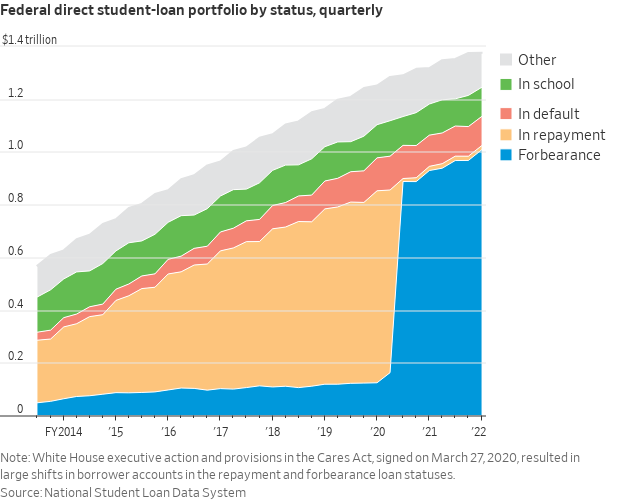
— Special election in California’s 22nd District will go to a June 7 runoff after no candidate received a majority of the vote. State Assemblywoman Connie Conway (R) advanced to the runoff, the Associated Press reports, but it could take days to find out whom she’ll face because of delayed vote counting.
— Noem to speak today. South Dakota Gov. Kristi Noem, a potential 2024 presidential candidate who has closely associated herself with Donald Trump, is expected to deliver a high-profile speech today on the future of the GOP that may not mention the former president at all.
— GOP U.S. Rep. Fred Upton of Michigan said he plans to retire ahead of a more challenging primary that was already the target of former President Donald Trump. His retirement was expected. The recent once-a-decade redistricting process put the moderate Upton, of St. Joseph, and sixth-term Republican Rep. Bill Huizenga of Holland Township in the same GOP-leaning seat in the state’s southwestern corner.
|
OTHER ITEMS OF NOTE |
—U.S., United Kingdom and Australia added hypersonic weapons development to the AUKUS portfolio in a Tuesday announcement. The three nations agreed to begin “new trilateral cooperation on hypersonics and counter-hypersonics and electronic warfare capabilities, as well as to expand information sharing and to deepen cooperation on defense innovation.” Zhang Jun, China’s ambassador to the United Nations, criticized the announcement, saying it would “lead the other parts of the world into a crisis” like that in Ukraine.
— Ohio, Tennessee seek to revive challenge to Obama-era WOTUS rule. Ohio and Tennessee want the Sixth Circuit to reverse a lower court’s decision and allow them to proceed with their challenge to an Obama-era Clean Water Act rule, according to a filing on Tuesday in the appeals court. The states sued to block the “waters of the United States” rule, known as WOTUS, issued in 2015. The rule redefined which waters qualify for federal protections under the CWA.
— 2.4 million is the estimated shortfall of immigrants of working age in the U.S., compared with pre-2017 immigration trends. Trump-era policies and the Covid-19 pandemic led to an immigration slowdown that has left the U.S. with fewer foreign-born workers. The smaller number of immigrants appears to be one reason why wages are growing briskly in industries where vacancies are high, from hospitality to long-term care. In healthcare and social assistance, which includes nursing homes, 17.2% of workers are foreign born, and 9% of jobs are vacant.
— A global deal to introduce a 15% minimum tax rate on company profits, already stalled in the U.S., hit an international roadblock as Poland vetoed an EU agreement to implement it.






